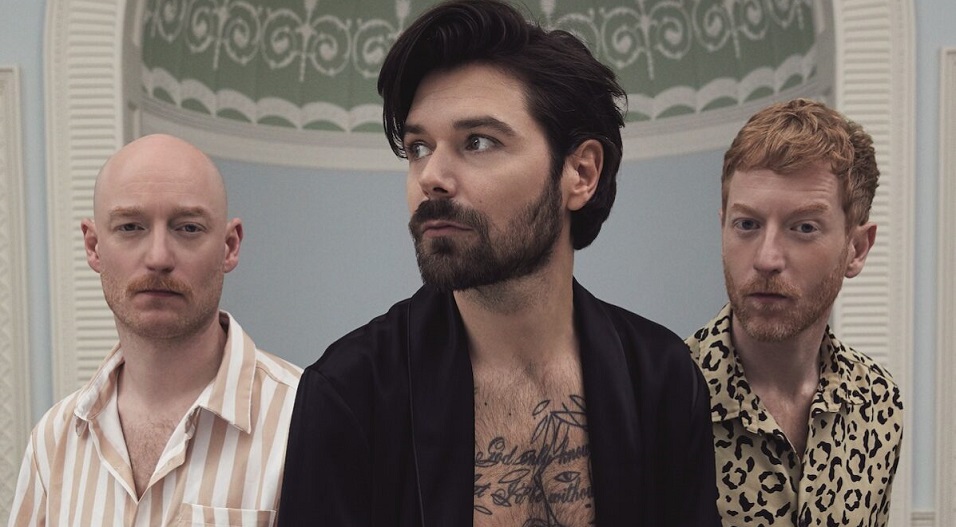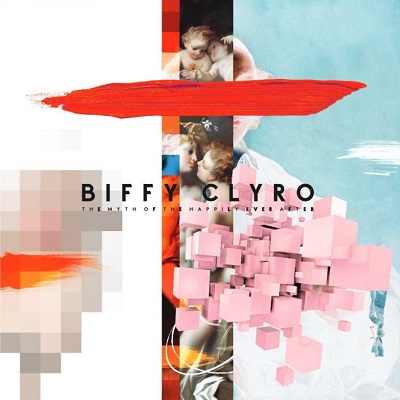Album Review: Biffy Clyro – The Myth Of The Happily Ever After
4 min read
When you hear the lines, “This is how you f**k it from the start” in the opening song of an album, you’d be forgiven for questioning the direction the music you’re about to listen to is going to go in. Biffy Clyro don’t stop with this lyric from record opener DumDum though, the Scottish band keep us surprised yet enthralled by the plethora of different styles they delve into in The Myth of The Happily Ever After, their 9th studio album.
 The Kilmarnock natives take us off guard straight away, with electronic ambient synths sweeping us into DumDum, sounding similar to something we might expect from The 1975. Of course, our introduction to the record soon builds into a heavier track, more recognisable as the Biffy Clyro style we’ve come to know over the last 19 years. However, the lyrics hint at a newfound maturity in the band, with a much more cynical and unorthodox style than much of the bands previous works, as highlighted at the beginning of the article.
The Kilmarnock natives take us off guard straight away, with electronic ambient synths sweeping us into DumDum, sounding similar to something we might expect from The 1975. Of course, our introduction to the record soon builds into a heavier track, more recognisable as the Biffy Clyro style we’ve come to know over the last 19 years. However, the lyrics hint at a newfound maturity in the band, with a much more cynical and unorthodox style than much of the bands previous works, as highlighted at the beginning of the article.
Biffy have developed a style over the years that has seen them become synonymous with stadium rock anthems, perfect for singalongs and moshpits alike at live events. This classic Biffy song blueprint is prevalent throughout The Myth…., with their Foo Fighters inspired guitar riffs giving many of the tracks here that powerful energy every Biffy fans love so dearly. A Hunger in your Haunt and Denier are two of the best examples of this exact energy, with A Hunger in your Haunt giving off the aura of an anthem that has the potential to become a festival classic in no time at all. It is also here that frontman Simon Neil delivers through the roof vocals, with shades of Mr Dave Grohl himself ever so present in the voice of the Scotsman at many points.
Last year Biffy claimed that this album would be made up of songs that never made it onto their 2020 release A Celebration of Endings. From this description of the record, it would have been easy to assume that The Myth of The Happily Ever After was going to be nothing more than an assortment of glorified B-side level tracks. But that could not be further from the truth, this is a well-thought-out record from start to finish, arguably being even more complete than its predecessor A Celebration of Endings.
The big difference between the two is the time period in which they recorded, with The Myth… notably being recorded during the devastating pandemic period the world is only just starting to come out of. The effects of the COVID crisis can be felt astoundingly throughout the album, with deep, complex messages being sent to us by Neil, with Existed being an example of how wise he has become over this time, with a more profound message than what we usually get from Biffy coming in lines such as “We all get it wrong sometimes/doesn’t mean we shouldn’t try” and “we can be better now” being reflective of the important realisations so many of us came to when given more time to think about things during lockdown.
As can be deciphered from many of the song titles within this record, there is a constant religious imagery present throughout, from the moral conundrum in the lyrics of Holy Water, to the organs echoing at the start of Unknown Male 01. However, it is no stronger than in Errors in the History of God a song where Neil calls out the corruptions caused by religious institutions over history, in doing so showing us once again the new levels of perceptiveness Neil has found over the course of the last year.
This album really has a mix of so many different styles, coming both unexpectedly and bravely. The band move further from the more radio friendly soft rock style they have become known for in recent times, and take a big step forward in terms of their musical progression as a band in an album that could very well be their most experimental to date, taking elements from Radiohead’s playbook with the robotic ad libs of Slurpy Slurpy Sleep Sleep, and giving acoustic ballads an injection of Biffy Clyro style, by having a bass walk down plunge Holy Water into heavy rock number halfway through its runtime. It is an album that will give you a brand-new perspective on the Scottish group, with so much deviation from their usual style The Myth of The Happily Ever After is an album that should be checked out by everybody, even those who have been sceptical of the band in the past.



